情态动词Model verbs[上学期]
文档属性
| 名称 | 情态动词Model verbs[上学期] |  | |
| 格式 | rar | ||
| 文件大小 | 146.9KB | ||
| 资源类型 | 教案 | ||
| 版本资源 | 通用版 | ||
| 科目 | 英语 | ||
| 更新时间 | 2006-10-15 20:26:00 | ||
图片预览

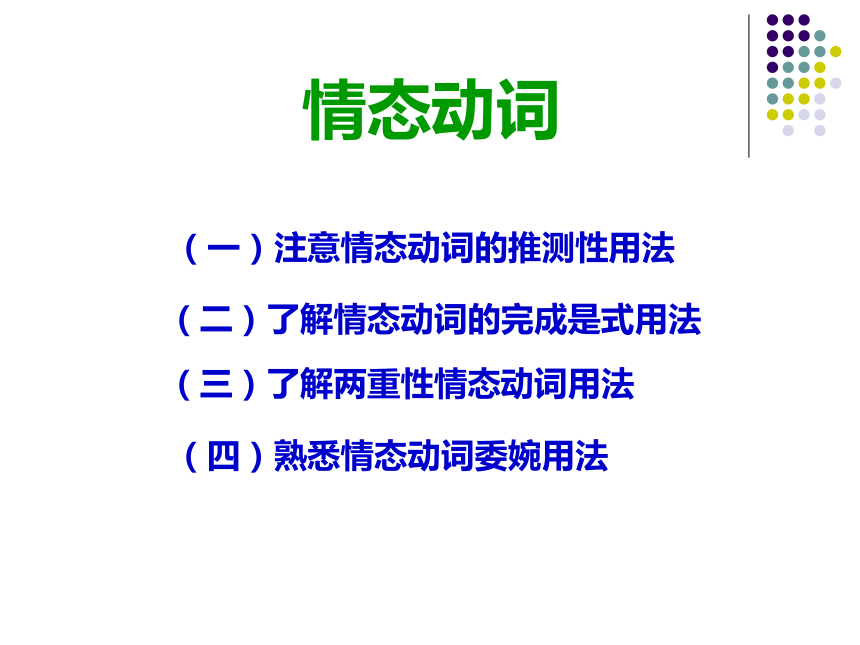
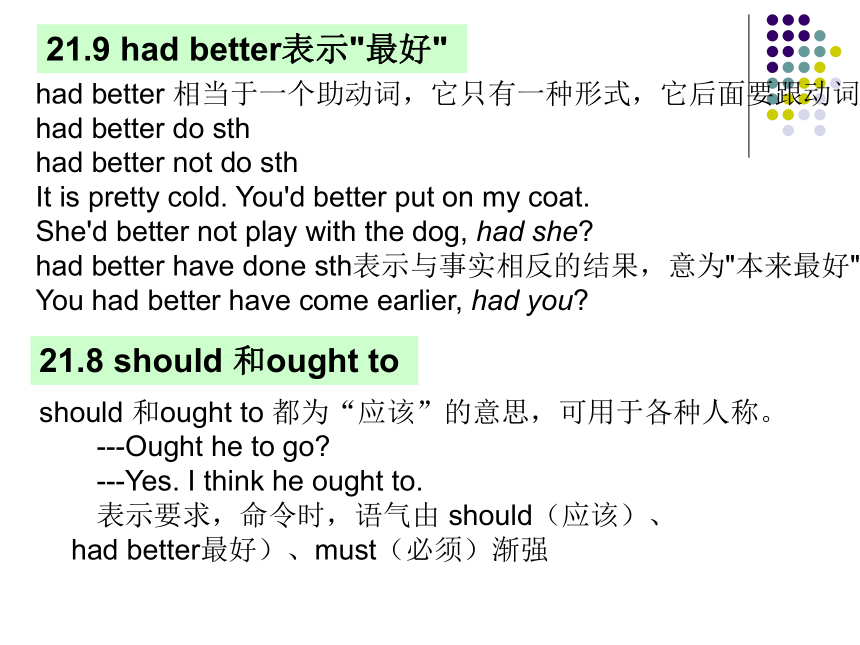
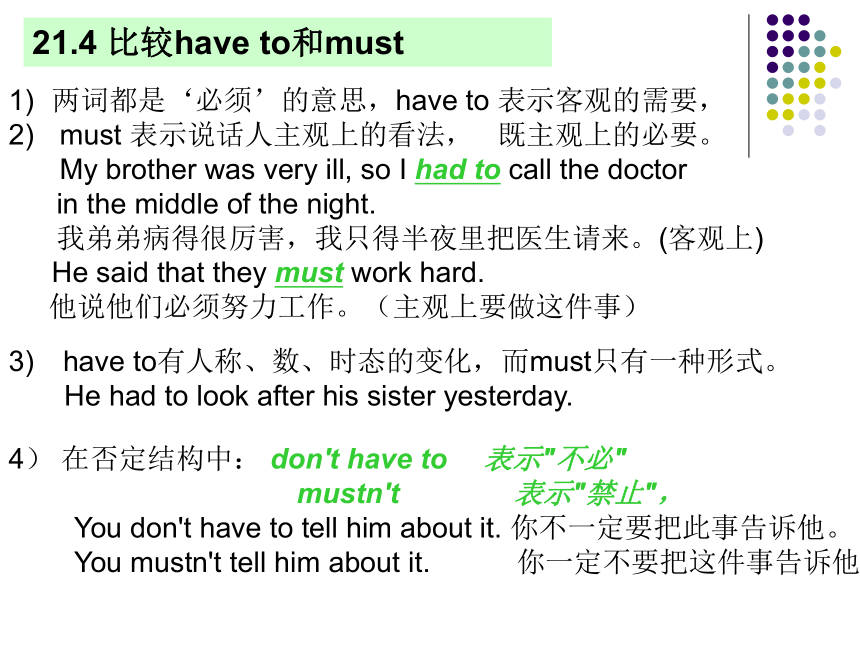

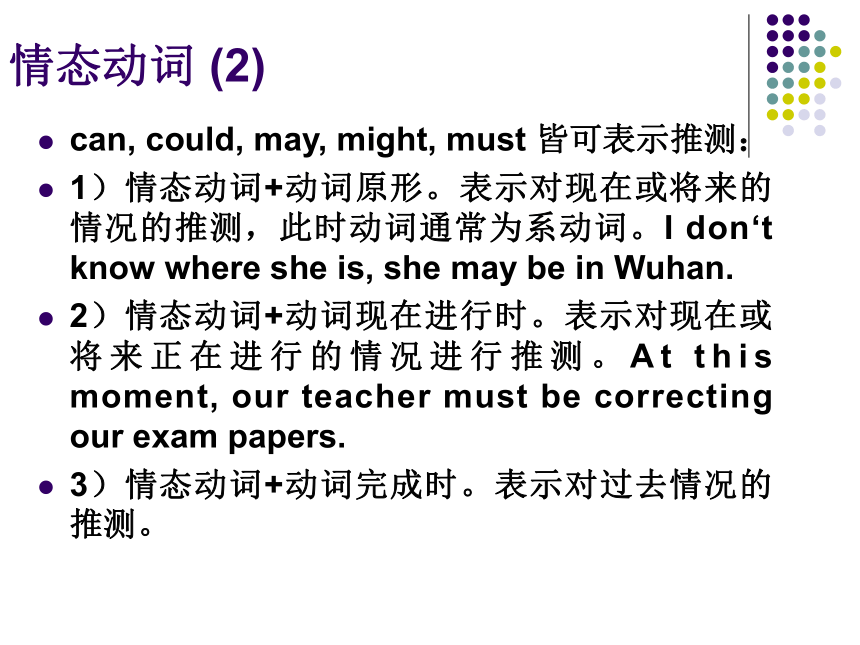
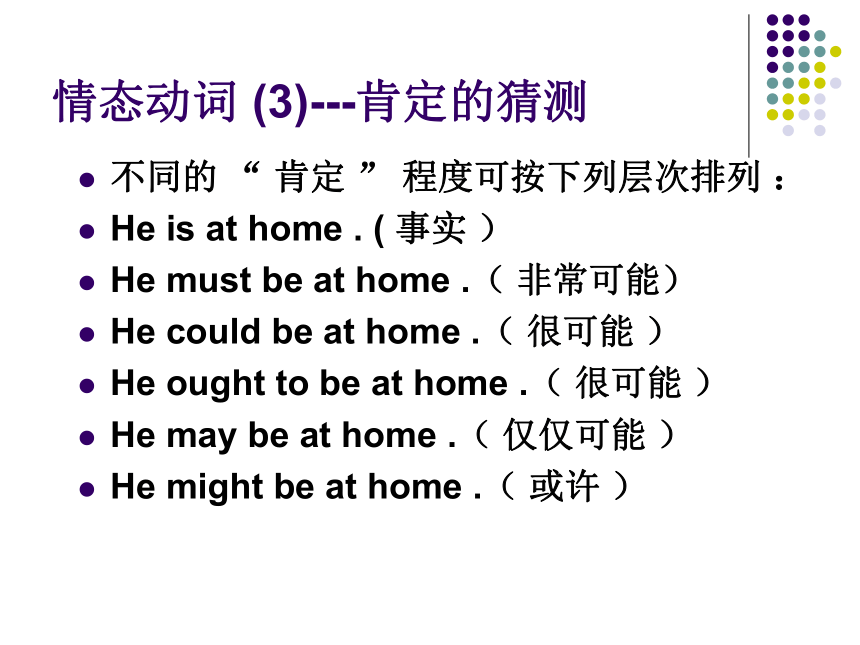

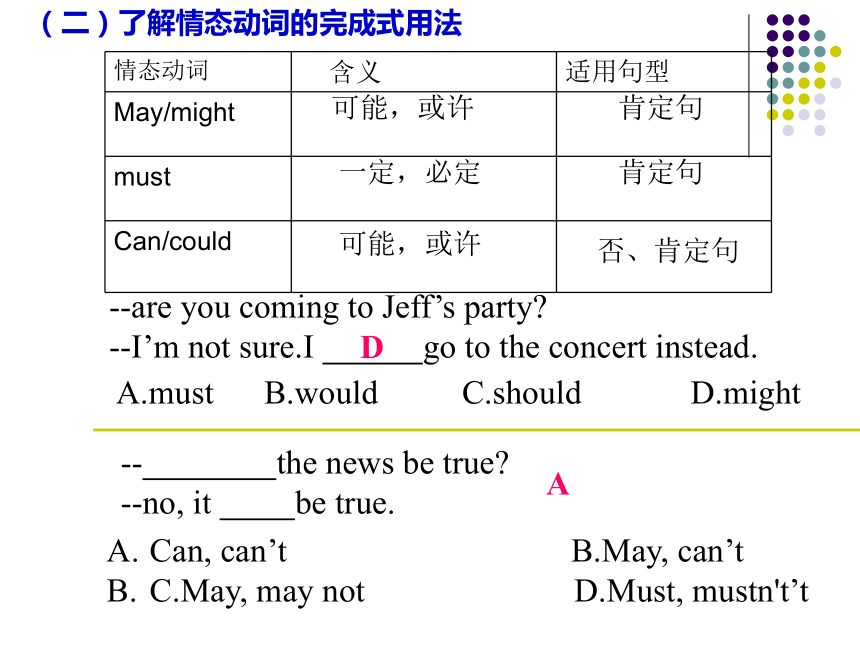
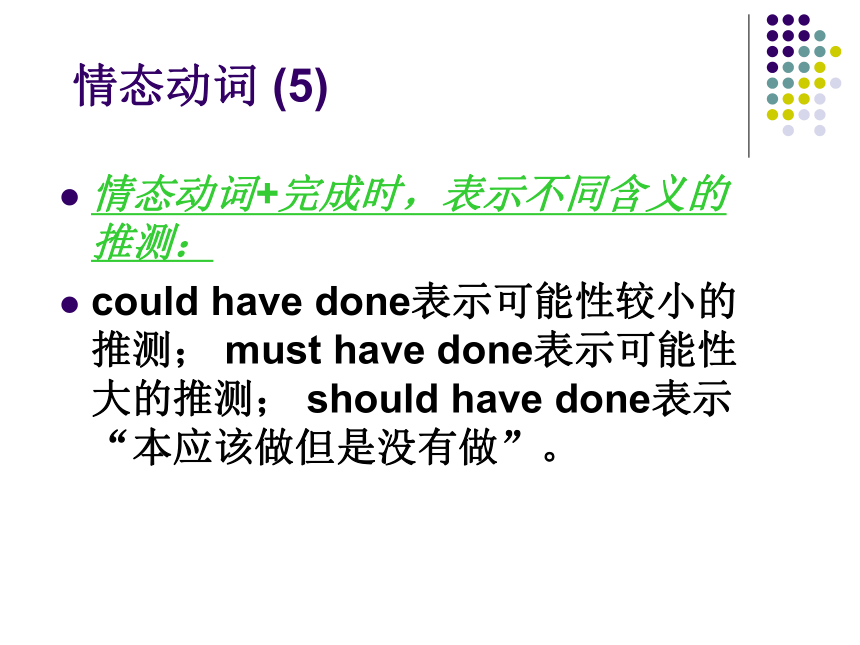
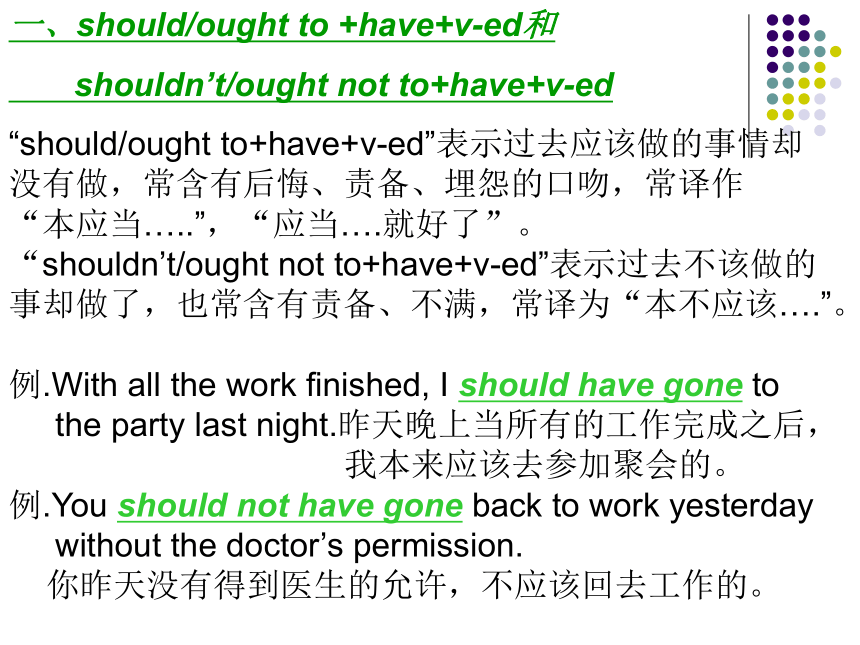
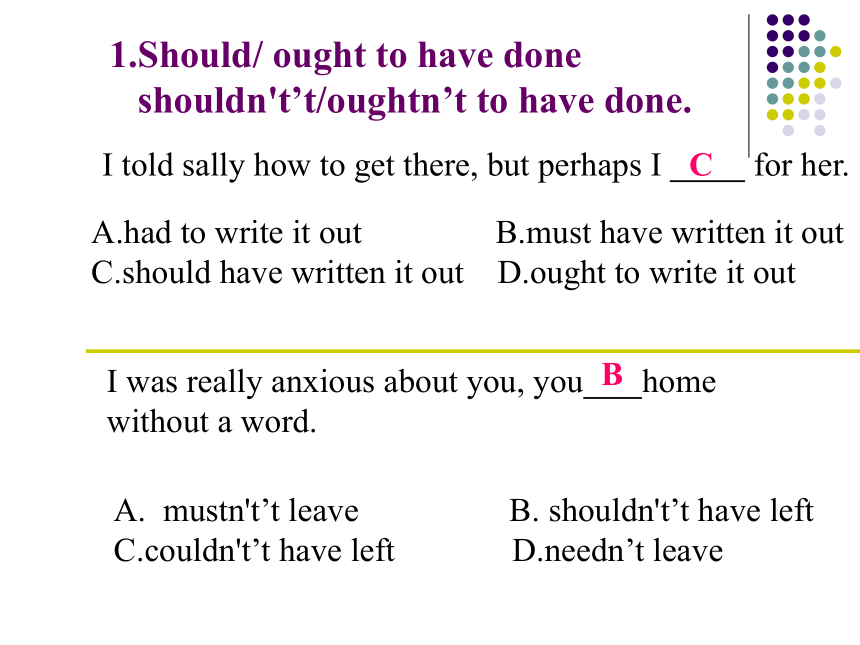
文档简介
课件34张PPT。Attention(一)注意情态动词的推测性用法(二)了解情态动词的完成是式用法(三)了解两重性情态动词用法(四)熟悉情态动词委婉用法情态动词21.9 had better表示"最好" had better 相当于一个助动词,它只有一种形式,它后面要跟动词原形。
had better do sth had better not do sth
It is pretty cold. You'd better put on my coat.
She'd better not play with the dog, had she? had better have done sth表示与事实相反的结果,意为"本来最好"。
You had better have come earlier, had you?21.8 should 和ought to should 和ought to 都为“应该”的意思,可用于各种人称。
---Ought he to go?
---Yes. I think he ought to.
表示要求,命令时,语气由 should(应该)、
had better最好)、must(必须)渐强 21.4 比较have to和must 两词都是‘必须’的意思,have to 表示客观的需要,
must 表示说话人主观上的看法, 既主观上的必要。 My brother was very ill, so I had to call the doctor
in the middle of the night.
我弟弟病得很厉害,我只得半夜里把医生请来。(客观上) He said that they must work hard.
他说他们必须努力工作。(主观上要做这件事) 3) have to有人称、数、时态的变化,而must只有一种形式。
He had to look after his sister yesterday. 4) 在否定结构中: don't have to 表示"不必" mustn't 表示"禁止", You don't have to tell him about it. 你不一定要把此事告诉他。 You mustn't tell him about it. 你一定不要把这件事告诉他 21.3 比较may和might1) 表示允许或请求;表示没有把握的推测;may 放在句首,
表示祝愿。 May God bless you! He might be at home. 注意: might 表示推测时,不表示时态。只是可能性比may 小 典型例题 Peter ___come with us tonight, but he isn't very sure yet. A. must B. may C. can D. will 答案B. 表可能性只能用may. 此句意可从后半句推出 情态动词 (2)can, could, may, might, must 皆可表示推测:
1)情态动词+动词原形。表示对现在或将来的情况的推测,此时动词通常为系动词。I don‘t know where she is, she may be in Wuhan.
2)情态动词+动词现在进行时。表示对现在或将来正在进行的情况进行推测。At this moment, our teacher must be correcting our exam papers.
3)情态动词+动词完成时。表示对过去情况的推测。情态动词 (3)---肯定的猜测不同的 “ 肯定 ” 程度可按下列层次排列 :
He is at home . ( 事实 )
He must be at home .( 非常可能)
He could be at home .( 很可能 )
He ought to be at home .( 很可能 )
He may be at home .( 仅仅可能 )
He might be at home .( 或许 ) 情态动词 (4)---否定的猜测He isn’t at home .( 事实 )
He can‘t be home .( 接近肯定 )
He couldn’t be at home .
( 不及 can’t 肯定 )
He may not be at home .
( 可能 ,但不肯定 )
He might not be at home .
( 不及 may 肯定 )。 可能,或许一定,必定可能,或许肯定句肯定句否、肯定句--are you coming to Jeff’s party?
--I’m not sure.I go to the concert instead. A.must B.would C.should D.might-- the news be true?
--no, it be true.Can, can’t B.May, can’t
C.May, may not D.Must, mustn't’tDA(二)了解情态动词的完成式用法情态动词+完成时,表示不同含义的推测:
could have done表示可能性较小的推测; must have done表示可能性大的推测; should have done表示“本应该做但是没有做”。情态动词 (5)
“should/ought to+have+v-ed”表示过去应该做的事情却
没有做,常含有后悔、责备、埋怨的口吻,常译作
“本应当…..”,“应当….就好了”。
“shouldn’t/ought not to+have+v-ed”表示过去不该做的
事却做了,也常含有责备、不满,常译为“本不应该….”。
例.With all the work finished, I should have gone to
the party last night.昨天晚上当所有的工作完成之后,
我本来应该去参加聚会的。 例.You should not have gone back to work yesterday
without the doctor’s permission. 你昨天没有得到医生的允许,不应该回去工作的。 一、should/ought to +have+v-ed和
shouldn’t/ought not to+have+v-ed 1.Should/ ought to have done
shouldn't’t/oughtn’t to have done.I told sally how to get there, but perhaps I for her.A.had to write it out B.must have written it out
C.should have written it out D.ought to write it outI was really anxious about you, you home without a word.A. mustn't’t leave B. shouldn't’t have left
C.couldn't’t have left D.needn’t leaveCB 2.may/might have done 可能已做
must have done 一定已做
can’t have done 不可能已做1). “ must + have +过去分词”表示对过去所发生的动作或存在的状态很有把握的一种推测,也可以表示对到目前为止的情况的推测,意为“一定…想必…。在使用这一句型时,要注意:
①这种句型的否定式不能使用“ mustn‘’t + have + 过去分词”,而要使用“ can‘’t ( couldn‘’t ) + have + 过去分词”结构,因为 mustn‘’t 表示“绝对禁止”;
②这种句型结构的疑问式,也不能将 must 调至主语之前,而要用 can ( could )来取代 must ,构成“ Can ( Could ) sb. have done... ?” 1),You must have got up late this morning, otherwise you would have caught the first bus.
例: I didn''t hear the phone. I _____ asleep. ( MET1989 ) A. must be B. must have been
C. should be D. should have been 析: B 。说话人根据自己没有听到电话响这一事实,推测自己一定睡着了。 2.may/might have done 可能已做
must have done 一定已做
can’t have done 不可能已做Where is my pen? I it.A.might lose B.would have lost
C.should have lost D.must have lostThe light in his room is still on, so he to bed.A.mustn't’t have gone B.must have gone
C.shouldn't’t have gone D.can’t have goneDD(4)“may/might+have done”表示的可能性最小。
might比may可能性更小,语气更委婉,主要用于肯定句,
可译为“或许”。
例如:I think he may/might have gone to bed.
我想他或许已上床睡
might也可表示对听话人的委婉责备或庆幸等情感。
You might have told me the news earlier.
你本可以早点把消息告诉我。( 3) “ may ( might )+ have +过去分词”表示(过去)可能做到的事,但实际上并没有做。意为“也许已经……,可能已经……”。 这种结构常用于肯定句或否定句中,不能构成疑问句式,其疑问句式常用“ can ( could )+ have +过去分词”结构。
例如: You may have taken the umbrella by mistake.
你可能拿错雨伞了吧。 (三)了解两重性情态动词用法need/ dare/used to 既可作实义动词又可作情态动词You need do it at once.
You need to do it at once.Need 作情态动词只能用于疑问句和否定句You daren’t to do it .
You daren’t do it .He used to not go there.
He did’t used to go there.He used to smoke a lot, usedn’t he/didn’t he?(四)熟悉情态动词委婉用法Could ,would ,might 表示语气委婉,客气,礼貌,
常用于疑问句。E.g
Would you please, /would you mind, / would like to --could you borrow your dictionary, please?
--yes, of course you .A.might B.will C.can D.should you mind my smoking here?A.should B.could C.might D.would CD1. Michael______be a policeman,for he's much too short.(上海)
A.needn't B.can't C.should D.may
这是对目前的情况进行推测,由for he's much too short
可知Michael不是警察,选B 3. Are you coming to Jeffs party?
I'm not sure.I______go to the concert instead.(NMET 2000)
A.must B.would C.should D.might
这是在谈论将来的打算,对将来的推测。选D。2. Johnny, you _____ play with the knife, you ____ hurt
yourself.
A. won’t; can’t B. mustn’t; may
C. shouldn’t; must D. can’t; shouldn’t●4.Jack______yet,otherwise he would have telephoned me.(上海1997)
A.mustn't have arrived B.shouldn't have arrived
C.can't have arrived D.need not have arrived
Mustn't在英国英语中通常只能表示“禁止,千万不要,肯定不”
而不能表示推测,Shouldn't表示“不该做”,can't表示“不可能”,
need not表示“没必要”。选C。5.Peter______come with us tonight, but he isn't very sure
yet.(NMET1993)
A.can B.may C.will D.must
在这四个选项中,表示可能性时,may的可能性最小,
can略大,will又大些,意为“将会”must最大,意为“肯定”。选B 6.There was a lot of fun at yesterday's party. You______come,
but why didn't you?(上海1999)
A.must have B.should C.need have D.ought to have
这是对过去的情况进行推测,选D。2.I want to go to the hospital, but you with me .A.need to not go B.do not need to
C.need not go D.need go out3.The boy be hungry now. He’s just had a big dinner.A.mustn’t B.can’t C.mayn’t D.needn’t4.—where is Anna?
---she at home.A.may have been B.may be
C.might have been D.can be CBB6.the door is still closed. He the key.A.must have lost B.must lost
C.need have lost D.lostA9.when Marx was in London, he read at the library
for hours.A.would B.might C.could D.shouldA11. the prisoner have run away this way for here
are his footprints.A.should B.could C. need D.must D14. You ,there is plenty of time before the train arrives.A.needn’t hurry B.mustn’t hurry
C.wouldn’t hurry D.won’t hurry15. My aunt here by now , for she took the early bus.A.must arrive B.can arrive
C.may arrive D.ought to have arrived16.I do not believe him, he be serious.A.needn’t B.can’t C . shouldn’t D.mustn’t ADB17. You are late,. You twenty minutes age.A.should come B.should have come
C.should be come D should came.18. She doesn't answer the door bell. She asleep.A.ought to be B.might be
C.must have be D.should be 19. This medicine before dinner.A.should have took B.should have been took
C.should be took D.should have been taken BBD21.14 比较need和dare need既可用作情态动词,也可用作实义动词。当need作
情态动词时,主要用于否定句和疑问句,第三人称单数不加s,
过去不加ed;当need作实义动词时,可用于肯定句,否定句
和疑问句中,第三人称单数要加s,过去时要加ed, 其后接的
不定式要加to。 例:I want to go to the dentist,but you need not go with me.. 我要去看牙科医生,但你不必跟我一起去。( need作情态动词) 例:He needs to buy a new pair of shoes. 他需要买一双新鞋子。(need作实义动词) dare的用法与need用法相似,既可作情态动词,又可作实义动词。
当dare作情态动词时,第三人称单数不加s,过去时不加d;
当dare作实义动词时,第三人称单数要加s,过去时要加d,
其后接的不定式国to 或不加to ,都可以。 例:He dare express his views boldly. 他敢大胆发表意见。 例:He dares to go alone. 1)can could 表示能力;可能 (过去时用could), 只用于现在式和过去式(could)。be able to可以用于各种时态。 They will be able to tell you the news soon. 他很快就能告诉你消息了。 2)只用be able to a. 位于助动词后。 b. 情态动词后。 c. 表示过去某时刻动作时。 d. 用于句首表示条件。 e. 表示成功地做了某事时,只能用was/were able to, 不能用could。 He was able to flee Europe before the war broke out. = He managed to flee Europe before the war broke out. 注意:could不表示时态 1)提出委婉的请求,(注意在回答中不可用could)。 --- Could I have the television on? --- Yes, you can. / No, you can't. 2)在否定,疑问句中表示推测或怀疑。 He couldn't be a bad man. 他不大可能是坏人。21.2 比较can 和be able to 5.—who broke the glass?
---Xiao Liang .A.will not do B.should have
C.may have D.can have 6.the door is still closed. He the key.A.must have lost B.must lost
C.need have lost D.lost7.your shirt is dirty. it for you.A.Am I going to wash B.Will I wash
C.Am I washing D.Shall I washCAD8.You hours when I went to your room.A.must work B.have worked
C.must have been working D.must be working9.when Marx was in London, he read at the library
for hours.A.would B.might C.could D.should10. Messages be changed form sound into
electricity before they be sent by radio.A.must;will B.have to; can
C.can ; must D.need; may CAB11. the prisoner have run away this way for here
are his footprints.A.should B.could C. need D.must 12. bring you something to eat?A.Will I B. Shall I
C.Would you like that I D.Do you want me 13. We did not seen him at the lecture yesterday,
he it .A.mustn’t attend B.can’t have attended
C.would not have attended D.mustn’t have attendedDBB20.--- he pen the door?
--- yes, please.A.Shall B.Will C. Can D. Would21. ---Must i be a good swimmer or be a diver?
--- .A.No, you needn’t B.Yes, you needn’t
C.No, you don’t D.No , you mustn’t22.The American speak Chinese, but he writhe it well.A.must;must B.can ;can not
C.will; will not D.would; would not AAB3. could have done
couldn't have done --There were already five people in the car, but they managed to take me as well.
--It a comfortable journey.A.can’t be B.shouldn’t be
C.mustn’t have been D.couldn’t have been--I stayed at a hotel while in New York.
--oh, did you? You with Jane.A.could have stayed B.could stay
C.would stay D.must have stayedDA4.needn’t have doneYou passed the exam very smoothly,
so you about it .A.can’t have worried
B.couldn’t have worried
C.mustn’t have worried
D.needn’t have worriedD情态动词 (4)“ could + 完成时 ” , 用于肯定句中 ,可以表示“ 本来可以完成而未完成的动作 ” 。表示与过去事实相反的推测,含有“其实、本来可以”之意。含有责备之意或表示遗憾。例如:
We could have walked to the station;it was so near .
此外,它也可以表示“猜测”,但不很确定。
I could have lost it there.
Of course, he could have asked for help there.当然,他本来可以到那里去求助的。
A few minutes earlier and we could have caught the train.早几分钟来我们就能赶上火车了。
表示比can的可能性更小,语气更委婉的推测 23. Show himself in the front of the mirror?A.Dares the king B.Dare the king
C.Does the king dare D.Is king dare 24. He ought the child, but he did.A.not to have beaten B.to have not beaten
C.to have beaten D.to beat 25. Still for a moment please?
I want to take a photo of you .A.Will you keep B. Are you keeping
C.Are you going to keep D.Shall you keep BAA
had better最好)、must(必须)渐强 21.4 比较have to和must 两词都是‘必须’的意思,have to 表示客观的需要,
must 表示说话人主观上的看法, 既主观上的必要。 My brother was very ill, so I had to call the doctor
in the middle of the night.
我弟弟病得很厉害,我只得半夜里把医生请来。(客观上) He said that they must work hard.
他说他们必须努力工作。(主观上要做这件事) 3) have to有人称、数、时态的变化,而must只有一种形式。
He had to look after his sister yesterday. 4) 在否定结构中: don't have to 表示"不必" mustn't 表示"禁止", You don't have to tell him about it. 你不一定要把此事告诉他。 You mustn't tell him about it. 你一定不要把这件事告诉他 21.3 比较may和might1) 表示允许或请求;表示没有把握的推测;may 放在句首,
表示祝愿。 May God bless you! He might be at home. 注意: might 表示推测时,不表示时态。只是可能性比may 小 典型例题 Peter ___come with us tonight, but he isn't very sure yet. A. must B. may C. can D. will 答案B. 表可能性只能用may. 此句意可从后半句推出 情态动词 (2)can, could, may, might, must 皆可表示推测:
1)情态动词+动词原形。表示对现在或将来的情况的推测,此时动词通常为系动词。I don‘t know where she is, she may be in Wuhan.
2)情态动词+动词现在进行时。表示对现在或将来正在进行的情况进行推测。At this moment, our teacher must be correcting our exam papers.
3)情态动词+动词完成时。表示对过去情况的推测。情态动词 (3)---肯定的猜测不同的 “ 肯定 ” 程度可按下列层次排列 :
He is at home . ( 事实 )
He must be at home .( 非常可能)
He could be at home .( 很可能 )
He ought to be at home .( 很可能 )
He may be at home .( 仅仅可能 )
He might be at home .( 或许 ) 情态动词 (4)---否定的猜测He isn’t at home .( 事实 )
He can‘t be home .( 接近肯定 )
He couldn’t be at home .
( 不及 can’t 肯定 )
He may not be at home .
( 可能 ,但不肯定 )
He might not be at home .
( 不及 may 肯定 )。 可能,或许一定,必定可能,或许肯定句肯定句否、肯定句--are you coming to Jeff’s party?
--I’m not sure.I go to the concert instead. A.must B.would C.should D.might-- the news be true?
--no, it be true.Can, can’t B.May, can’t
C.May, may not D.Must, mustn't’tDA(二)了解情态动词的完成式用法情态动词+完成时,表示不同含义的推测:
could have done表示可能性较小的推测; must have done表示可能性大的推测; should have done表示“本应该做但是没有做”。情态动词 (5)
“should/ought to+have+v-ed”表示过去应该做的事情却
没有做,常含有后悔、责备、埋怨的口吻,常译作
“本应当…..”,“应当….就好了”。
“shouldn’t/ought not to+have+v-ed”表示过去不该做的
事却做了,也常含有责备、不满,常译为“本不应该….”。
例.With all the work finished, I should have gone to
the party last night.昨天晚上当所有的工作完成之后,
我本来应该去参加聚会的。 例.You should not have gone back to work yesterday
without the doctor’s permission. 你昨天没有得到医生的允许,不应该回去工作的。 一、should/ought to +have+v-ed和
shouldn’t/ought not to+have+v-ed 1.Should/ ought to have done
shouldn't’t/oughtn’t to have done.I told sally how to get there, but perhaps I for her.A.had to write it out B.must have written it out
C.should have written it out D.ought to write it outI was really anxious about you, you home without a word.A. mustn't’t leave B. shouldn't’t have left
C.couldn't’t have left D.needn’t leaveCB 2.may/might have done 可能已做
must have done 一定已做
can’t have done 不可能已做1). “ must + have +过去分词”表示对过去所发生的动作或存在的状态很有把握的一种推测,也可以表示对到目前为止的情况的推测,意为“一定…想必…。在使用这一句型时,要注意:
①这种句型的否定式不能使用“ mustn‘’t + have + 过去分词”,而要使用“ can‘’t ( couldn‘’t ) + have + 过去分词”结构,因为 mustn‘’t 表示“绝对禁止”;
②这种句型结构的疑问式,也不能将 must 调至主语之前,而要用 can ( could )来取代 must ,构成“ Can ( Could ) sb. have done... ?” 1),You must have got up late this morning, otherwise you would have caught the first bus.
例: I didn''t hear the phone. I _____ asleep. ( MET1989 ) A. must be B. must have been
C. should be D. should have been 析: B 。说话人根据自己没有听到电话响这一事实,推测自己一定睡着了。 2.may/might have done 可能已做
must have done 一定已做
can’t have done 不可能已做Where is my pen? I it.A.might lose B.would have lost
C.should have lost D.must have lostThe light in his room is still on, so he to bed.A.mustn't’t have gone B.must have gone
C.shouldn't’t have gone D.can’t have goneDD(4)“may/might+have done”表示的可能性最小。
might比may可能性更小,语气更委婉,主要用于肯定句,
可译为“或许”。
例如:I think he may/might have gone to bed.
我想他或许已上床睡
might也可表示对听话人的委婉责备或庆幸等情感。
You might have told me the news earlier.
你本可以早点把消息告诉我。( 3) “ may ( might )+ have +过去分词”表示(过去)可能做到的事,但实际上并没有做。意为“也许已经……,可能已经……”。 这种结构常用于肯定句或否定句中,不能构成疑问句式,其疑问句式常用“ can ( could )+ have +过去分词”结构。
例如: You may have taken the umbrella by mistake.
你可能拿错雨伞了吧。 (三)了解两重性情态动词用法need/ dare/used to 既可作实义动词又可作情态动词You need do it at once.
You need to do it at once.Need 作情态动词只能用于疑问句和否定句You daren’t to do it .
You daren’t do it .He used to not go there.
He did’t used to go there.He used to smoke a lot, usedn’t he/didn’t he?(四)熟悉情态动词委婉用法Could ,would ,might 表示语气委婉,客气,礼貌,
常用于疑问句。E.g
Would you please, /would you mind, / would like to --could you borrow your dictionary, please?
--yes, of course you .A.might B.will C.can D.should you mind my smoking here?A.should B.could C.might D.would CD1. Michael______be a policeman,for he's much too short.(上海)
A.needn't B.can't C.should D.may
这是对目前的情况进行推测,由for he's much too short
可知Michael不是警察,选B 3. Are you coming to Jeffs party?
I'm not sure.I______go to the concert instead.(NMET 2000)
A.must B.would C.should D.might
这是在谈论将来的打算,对将来的推测。选D。2. Johnny, you _____ play with the knife, you ____ hurt
yourself.
A. won’t; can’t B. mustn’t; may
C. shouldn’t; must D. can’t; shouldn’t●4.Jack______yet,otherwise he would have telephoned me.(上海1997)
A.mustn't have arrived B.shouldn't have arrived
C.can't have arrived D.need not have arrived
Mustn't在英国英语中通常只能表示“禁止,千万不要,肯定不”
而不能表示推测,Shouldn't表示“不该做”,can't表示“不可能”,
need not表示“没必要”。选C。5.Peter______come with us tonight, but he isn't very sure
yet.(NMET1993)
A.can B.may C.will D.must
在这四个选项中,表示可能性时,may的可能性最小,
can略大,will又大些,意为“将会”must最大,意为“肯定”。选B 6.There was a lot of fun at yesterday's party. You______come,
but why didn't you?(上海1999)
A.must have B.should C.need have D.ought to have
这是对过去的情况进行推测,选D。2.I want to go to the hospital, but you with me .A.need to not go B.do not need to
C.need not go D.need go out3.The boy be hungry now. He’s just had a big dinner.A.mustn’t B.can’t C.mayn’t D.needn’t4.—where is Anna?
---she at home.A.may have been B.may be
C.might have been D.can be CBB6.the door is still closed. He the key.A.must have lost B.must lost
C.need have lost D.lostA9.when Marx was in London, he read at the library
for hours.A.would B.might C.could D.shouldA11. the prisoner have run away this way for here
are his footprints.A.should B.could C. need D.must D14. You ,there is plenty of time before the train arrives.A.needn’t hurry B.mustn’t hurry
C.wouldn’t hurry D.won’t hurry15. My aunt here by now , for she took the early bus.A.must arrive B.can arrive
C.may arrive D.ought to have arrived16.I do not believe him, he be serious.A.needn’t B.can’t C . shouldn’t D.mustn’t ADB17. You are late,. You twenty minutes age.A.should come B.should have come
C.should be come D should came.18. She doesn't answer the door bell. She asleep.A.ought to be B.might be
C.must have be D.should be 19. This medicine before dinner.A.should have took B.should have been took
C.should be took D.should have been taken BBD21.14 比较need和dare need既可用作情态动词,也可用作实义动词。当need作
情态动词时,主要用于否定句和疑问句,第三人称单数不加s,
过去不加ed;当need作实义动词时,可用于肯定句,否定句
和疑问句中,第三人称单数要加s,过去时要加ed, 其后接的
不定式要加to。 例:I want to go to the dentist,but you need not go with me.. 我要去看牙科医生,但你不必跟我一起去。( need作情态动词) 例:He needs to buy a new pair of shoes. 他需要买一双新鞋子。(need作实义动词) dare的用法与need用法相似,既可作情态动词,又可作实义动词。
当dare作情态动词时,第三人称单数不加s,过去时不加d;
当dare作实义动词时,第三人称单数要加s,过去时要加d,
其后接的不定式国to 或不加to ,都可以。 例:He dare express his views boldly. 他敢大胆发表意见。 例:He dares to go alone. 1)can could 表示能力;可能 (过去时用could), 只用于现在式和过去式(could)。be able to可以用于各种时态。 They will be able to tell you the news soon. 他很快就能告诉你消息了。 2)只用be able to a. 位于助动词后。 b. 情态动词后。 c. 表示过去某时刻动作时。 d. 用于句首表示条件。 e. 表示成功地做了某事时,只能用was/were able to, 不能用could。 He was able to flee Europe before the war broke out. = He managed to flee Europe before the war broke out. 注意:could不表示时态 1)提出委婉的请求,(注意在回答中不可用could)。 --- Could I have the television on? --- Yes, you can. / No, you can't. 2)在否定,疑问句中表示推测或怀疑。 He couldn't be a bad man. 他不大可能是坏人。21.2 比较can 和be able to 5.—who broke the glass?
---Xiao Liang .A.will not do B.should have
C.may have D.can have 6.the door is still closed. He the key.A.must have lost B.must lost
C.need have lost D.lost7.your shirt is dirty. it for you.A.Am I going to wash B.Will I wash
C.Am I washing D.Shall I washCAD8.You hours when I went to your room.A.must work B.have worked
C.must have been working D.must be working9.when Marx was in London, he read at the library
for hours.A.would B.might C.could D.should10. Messages be changed form sound into
electricity before they be sent by radio.A.must;will B.have to; can
C.can ; must D.need; may CAB11. the prisoner have run away this way for here
are his footprints.A.should B.could C. need D.must 12. bring you something to eat?A.Will I B. Shall I
C.Would you like that I D.Do you want me 13. We did not seen him at the lecture yesterday,
he it .A.mustn’t attend B.can’t have attended
C.would not have attended D.mustn’t have attendedDBB20.--- he pen the door?
--- yes, please.A.Shall B.Will C. Can D. Would21. ---Must i be a good swimmer or be a diver?
--- .A.No, you needn’t B.Yes, you needn’t
C.No, you don’t D.No , you mustn’t22.The American speak Chinese, but he writhe it well.A.must;must B.can ;can not
C.will; will not D.would; would not AAB3. could have done
couldn't have done --There were already five people in the car, but they managed to take me as well.
--It a comfortable journey.A.can’t be B.shouldn’t be
C.mustn’t have been D.couldn’t have been--I stayed at a hotel while in New York.
--oh, did you? You with Jane.A.could have stayed B.could stay
C.would stay D.must have stayedDA4.needn’t have doneYou passed the exam very smoothly,
so you about it .A.can’t have worried
B.couldn’t have worried
C.mustn’t have worried
D.needn’t have worriedD情态动词 (4)“ could + 完成时 ” , 用于肯定句中 ,可以表示“ 本来可以完成而未完成的动作 ” 。表示与过去事实相反的推测,含有“其实、本来可以”之意。含有责备之意或表示遗憾。例如:
We could have walked to the station;it was so near .
此外,它也可以表示“猜测”,但不很确定。
I could have lost it there.
Of course, he could have asked for help there.当然,他本来可以到那里去求助的。
A few minutes earlier and we could have caught the train.早几分钟来我们就能赶上火车了。
表示比can的可能性更小,语气更委婉的推测 23. Show himself in the front of the mirror?A.Dares the king B.Dare the king
C.Does the king dare D.Is king dare 24. He ought the child, but he did.A.not to have beaten B.to have not beaten
C.to have beaten D.to beat 25. Still for a moment please?
I want to take a photo of you .A.Will you keep B. Are you keeping
C.Are you going to keep D.Shall you keep BAA
